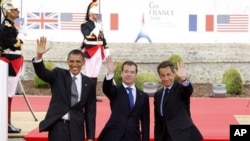With the closing of the G8 summit in Deauville, France, aid groups are once again saying leaders have failed to fully meet past promises.
World Vision, a Christian humanitarian organization, and other NGOs say the G8 is falling behind on commitments to development, health and hunger.
Deauville summit report card
“I’d probably give it a B minus,” said Robert Zachritz, World Vision’s government relations director, who’s in Deauville.
“They initially sought to inspire around the issues of freedom and democracy, but they really needed to be much stronger around the humanitarian values,” he said.
Zachritz praises the G8 for its honesty about past promises.
“They recognize that they’ve fallen about $19 billion short. They’ve made commitments around global AIDS, TB and malaria. Made commitments around global hunger…and child and maternal health. So, the good thing has been they’re being accountable for that,” he said, but added, “They need to be doing better.”
He warned of a pending food crisis and said thousands of young children are still dying every day from preventable causes. “There’s an urgency to those issues.”
Recession
The Deauville summit was held as the world continues to recover from a global recession.
“I think you need to recognize that,” said Zachritz, “but at the same time you can make commitments and you can make a difference. And the interventions for these items are very cost effective, even in tight economic times.”
These include low-cost interventions for malaria, such as bed nets, and immunizations for childhood diseases.
This week the G8 Research Group at the University of Toronto gave G8 nations a grade of B in keeping their promises. It said higher grades might be unrealistic until the world economy improves. The group also said NGOs naturally demand higher grades because their job is to advocate for their causes.
At the L’Aquila summit in 2009, the G8 pledged $22 billion for agricultural investment. It was in response to the 2007/2008 global food crisis, which brought soaring prices and tight supplies.
“They say they are committed to continually following through with that commitment, which is good. I think their disbursements are low. I think about 25 percent of those commitments have come forward,” he said.
At the earlier summit in Gleneagles, Scotland, leaders pledged universal access to AIDS prevention and treatment programs by 2010.
MDGs
The U.N. Millennium Development Goals are due in 2015. Many NGOs say without G8 funds, it will be difficult to achieve them on time.
“Clearly, that will have an impact,” said Zachritz, “And I think there weren’t really new commitments at this G8 around the Millennium Development Goals. But they were affirmed both in the main communiqué and in the joint statement with African leaders. So the commitment is there, which is good. And they’re not backing away from their past commitments even though they’re falling short.”
Still relevant
The importance of the G20 is now clear, as emerging nations take their place on the world stage. So, is the G8 still relevant?
“The G20 clearly has become the dominant group on the world economy. They recognized that at the G20 summit in Pittsburgh and so that was a change,” he said, “The G8 countries still give the majority of global development assistance. So, it’s still an important body.”
Zachritz said the G8 recognizes the need for new partners and new commitments. The next G20 summit is scheduled for November in Cannes, France.




